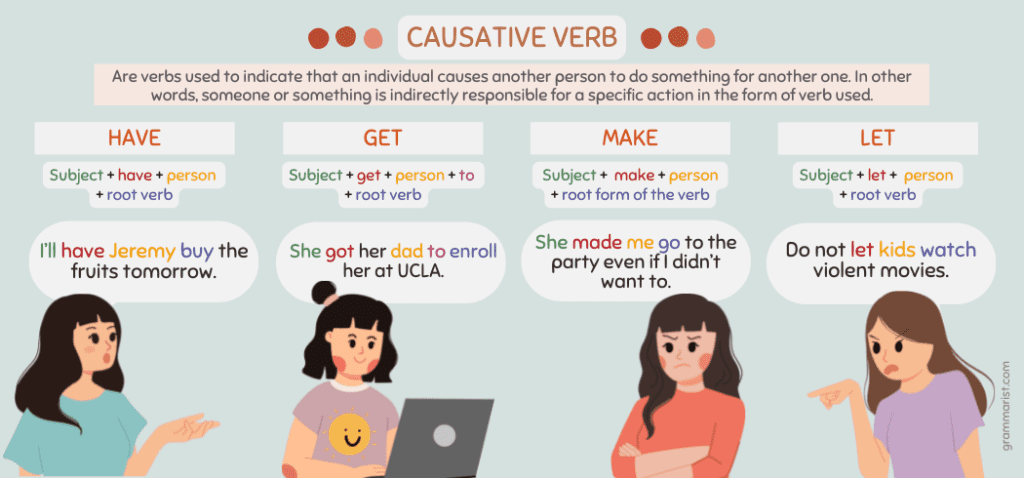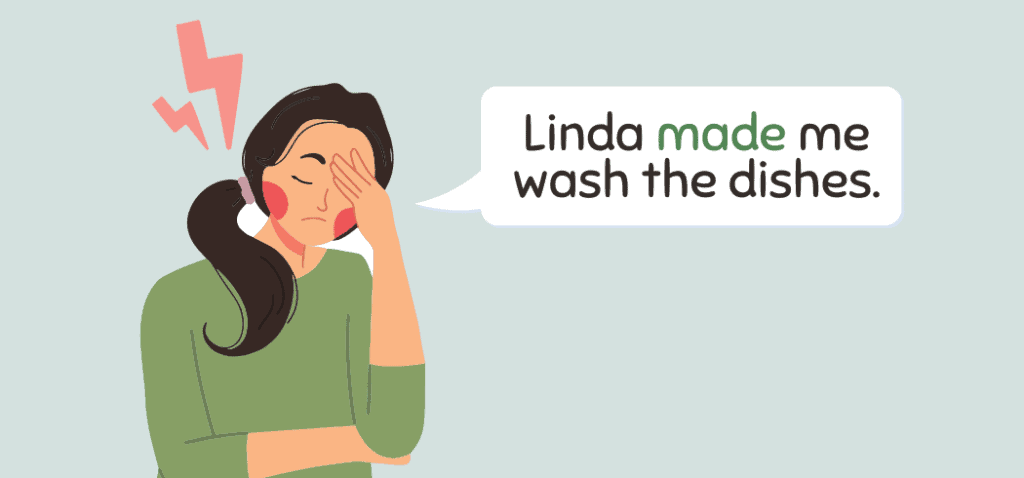You might be here wondering, “What are causative verbs, Candace?” Well, I’m going to explain it in a way that anyone can understand! Causative verbs are verbs that indicate that one individual, object, or event causes another to do something.
I’ll show you the meaning, functions, and examples of how to use causative verbs in your sentences. You’ll also get a list of causative verbs in the English language.
What is a Causative Verb?

Causative verbs or causatives are verbs used to indicate that an individual causes another person to do something for another one. In other words, someone or something is indirectly responsible for a specific action in the form of verb used.
Let’s remember from my other guides that the usual meaning of verbs are parts of speech that express time while showing an action, condition, or the fact that something exists.
For example:
- Why did you let him eat sweets?
In the sentence I wrote, I have the speaker noting that the person they are talking to is responsible for letting him eat sweets.
Here are more examples:
- Jane had Alexa clean the house.
- I had my car washed yesterday morning.
- I made my mother bake some cookies.
Causative Verb List
While you might not be familiar with a causative verb, you’ve probably used them several times in your writing. There are four popular causative verb examples in English.
- Have
- Get
- Make
- Let
Causative Verb Rules
Let’s look at how to form some causative sentences so you can better see the causative meaning behind the use of these verb phrases.
Have
Have is a common causative verb that means to permit someone to do something. In other words, you have someone do something. The correct sentence structure is:
- Subject + have + person + root verb.
For example:
- I’ll have Jeremy buy the fruits tomorrow. (simple future tense)
- I have had my sister share her room with Paula. (present perfect tense)
Get
Get has the same definition as have, but is less formal. It can also mean to trick somebody. The correct sentence structure when using this causative verb is:
- Subject + get + person + to + root verb.
For example:
- I got her to buy me tickets.
- She got her dad to enroll her at UCLA.
Make
Make does not have the same definition as have and get. It means to require, demand, or force someone to do something. The correct sentence structure here is:
- Subject + make + person + root form of the verb.
Here are some sentence samples.
- She made me go to the party even if I didn’t want to.
- My parents make me come home every summer break.
Let
This causative verb means to permit someone to perform a specific action. The correct structure is:
- Subject + let + person + root verb.
Here are some examples.
- Do not let kids watch violent movies.
- Let me know if you need help with the homework.
- She lets me borrow her phone sometimes.
Examples of Causative Verbs Sentences

Here are more examples of sentences with causative verbs.
- The president had the vice president lead the new dam project.
- You had me calling Julienne every day.
- I got my parents to buy me a new bike for my birthday.
- She got the teacher to dismiss the class on time today.
- She let me visit my friend today.
- Why did they let the dogs run without a leash?
- My teacher made me do my homework early.
- Linda made me wash the dishes.
Causative Verbs in a Nutshell
Hopefully, this article helped you learn the definition, formulas, and uses of causative common verbs. I hope it also made you recognize the causative verb in this sentence! Have you?
Causative verbs belong to the class of verbs that shows someone being responsible for a specific action. The four most common causative verbs are make, get, have, and let.
